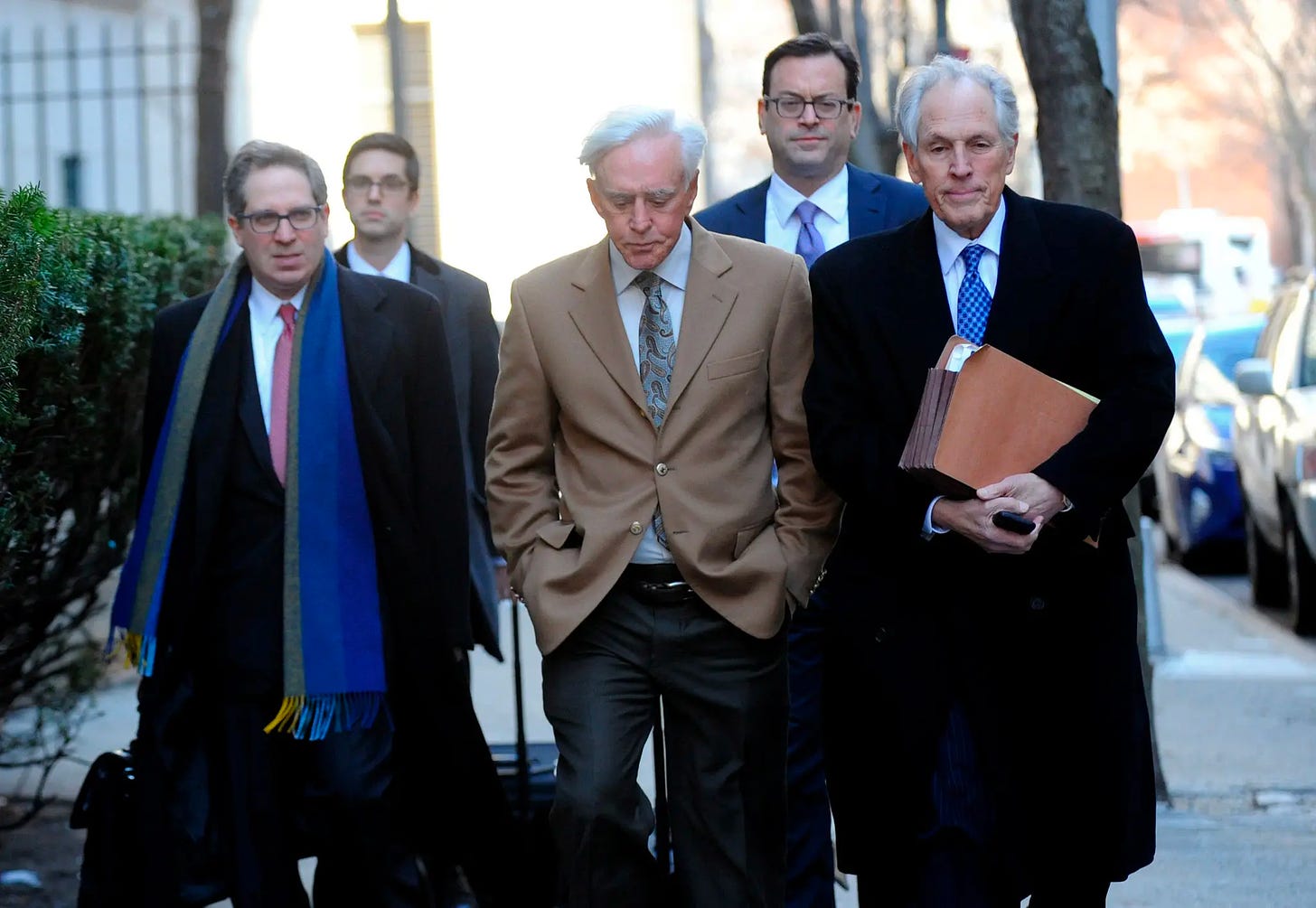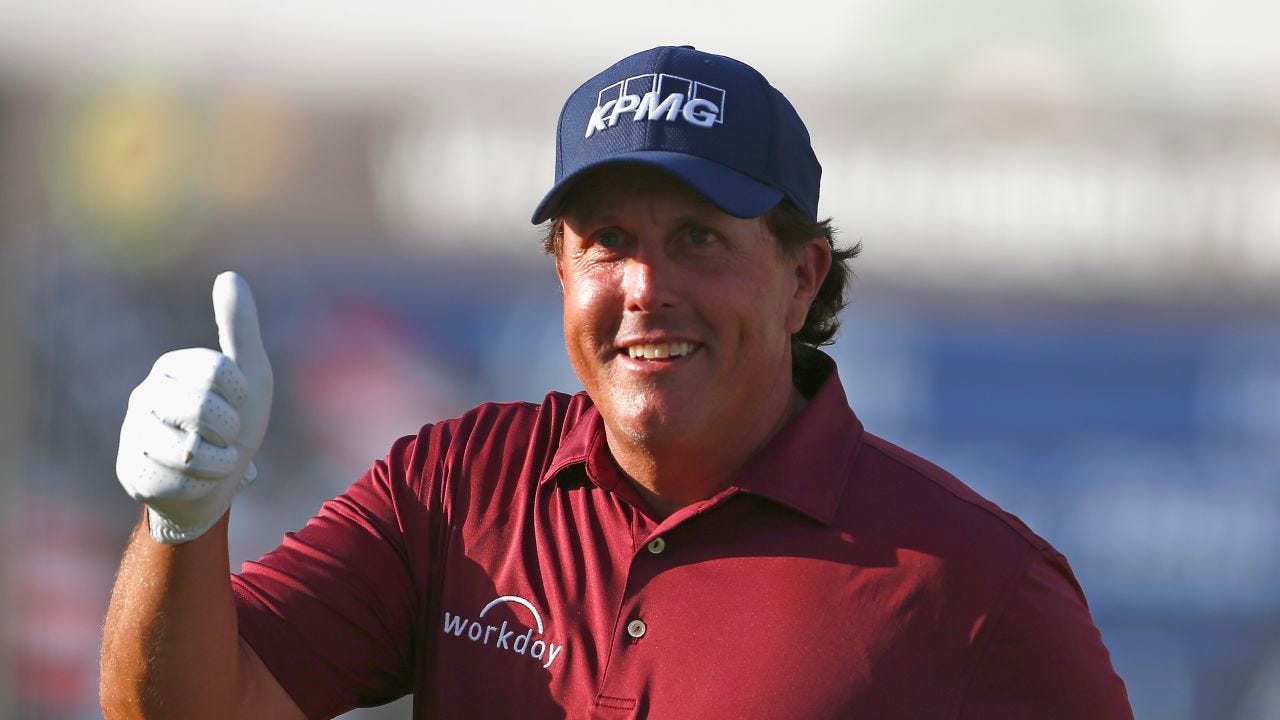How Phil Betrayed Billy: Legal Maneuvering and a Friendship Destroyed
In an excerpt from his autobiography, the author details how Mickelson escaped two perilous legal cases and reveals the awkward end to their close relationship
Excerpted from Gambler: Secrets from a Life at Risk, which can be preordered here.
I am staring at the world’s most famous left-handed golfer and can’t believe what he is saying. It’s a bright spring day in April 2017 and Phil Mickelson is sitting on my patio in Carlsbad, Calif., overlooking surfers on a sparkling blue Pacific Ocean.
By that point, Phil was a Hall of Fame golfer and winner of 43 tournaments on the PGA Tour. We had shared an eight-year friendship that featured rollicking rounds of golf and high-stakes sports gambling. When Phil showed up, he owed me $2.5 million on losing bets that I had placed on his behalf. I had let the debt slide for the better part of three years, and it had continued to grow. Frankly, there were more pressing matters on my mind, specifically a high-profile insider-trading case involving 10 counts of wire and securities fraud. The three-week criminal trial had just ended—badly, for me.
I’d lost the biggest bet of my life in front of 12 Manhattan jurors believing they would see through the government’s criminal case. The jury—prevented by the judge from hearing about the illegal actions of government agents—returned guilty verdicts on all charges.
When Phil arrived in his black, tricked-out SUV, I was in my 70th year of life, under house arrest with an electronic tracking bracelet around my right ankle, and racing to get my business affairs in order. I was awaiting a July hearing, which would deliver another shock to my system when the judge disregarded the official pre-sentencing recommendation of one year and a day in prison. Instead, he hit me with a sentence of five years.
As it turned out, Phil came to my home not to make amends or offer a mea culpa, as I had anticipated. Instead, he came to finally settle up the money he owed me. I sat there speechless as he moaned about losing lucrative sponsorships with ExxonMobil and Barclays along with 25 percent of his deal with KPMG. He even whined about the $32 million depreciation he had to take on his precious Gulfstream V jet. All the while, I was about to go to prison after losing a trial that cost me more than $100 million in legal fees, fines, and restitution.
I thought to myself: Thousands of people stand in line waiting for Phil’s autograph, but if I could buy back my association with him, I’d pay top dollar.
Phil ended our meeting with a bizarre invitation.
“I’m going to be here for the next two and a half weeks,” he told me. “Wanna play some golf?”
***
One month prior, in March 2017, as Susan and I flew to New York for the trial, I still was hoping that Phil would agree to testify. When we arrived in Manhattan, I learned through our lawyers that Phil intended to invoke his Fifth Amendment right against self-incrimination if we called him to the stand. I reached out to a mutual friend and asked a favor.
“Listen, I hate to put you in the middle of this,” I said. “But I need Phil to publicly declare what he told the FBI—that I never gave him inside information. I need you to ask him to do that. Tell him all I want him to do is tell the truth.”
A call was made. A meeting set.
According to our mutual friend, here is the message he delivered to Phil: “This is Bill’s life at stake. This is his freedom. He could potentially go to prison for a long time. He would like you to just say the truth: That Bill never gave you inside information.”
“Okay, I’ll do it,” Phil told him.
“Are you positive?” our friend asked. “Because when you leave, I’m going to call Bill.”
Phil reiterated that he would issue a statement.
But he never did.
To this day, after countless hours of reflection, I still wonder whether I would have walked out of court a free man had Phil testified or spoken out on my behalf. We knew the prosecution would not call Phil to testify because he’d already told FBI agents in two separate interviews that I had never provided him with insider information on Dean Foods or any other stock. The last thing prosecutors wanted to see, given the power of his celebrity and personality, was Phil Mickelson walking into a courtroom and testifying on the witness stand under oath that, as far as he knew, I was not guilty of the charges they’d brought against me.
But Phil did not do it.
Looking back, I realize there’s a common denominator in many of Phil’s long-term relationships—be it 30 years playing on the PGA Tour, 25 years working with caddie Jim “Bones” Mackay, 17 years betting with Gregory Silveira, or five years gambling with me. When push comes to shove, Phil doesn’t care about anyone except himself. Time and time and time again, he never stood up for a friend. He refused to simply tell the truth when it could have meant the difference between prison and exoneration.
***
Unknown to the public, Mickelson was involved in a separate money-laundering investigation. More than a decade before the start of my partnership with Phil, he had been betting big-time through Silveira, a former San Diego stockbroker and avid golfer. In the spring of 2010, Mickelson asked Silveira if he would do him a favor. Mickelson wanted to transfer several million dollars to Silveira and then have Silveira wire it from his personal bank account to the offshore book to pay off Phil’s gambling losses. Unfortunately for Silveira, he said yes. The wire transfer quickly caught the attention of the criminal division of the IRS.
With the feds on his heels, Phil told me that his friends at KPMG, his main corporate sponsor at the time, had introduced him to a D.C. attorney named Gregory Craig. He was not just any lawyer; Craig had been chief White House counsel for President Obama. With boyish looks and trademark white tousled hair, Craig had an Ivy League pedigree, having attended Harvard as an undergrad and Yale Law School. Craig also was tight with Preet Bharara, then the U.S. attorney in the powerful Southern District of New York, former U.S. attorney general Loretta Lynch, and the director of enforcement at the SEC. Now that’s political juice.
With Mickelson in the midst of a money-laundering investigation and a target of an insider-trading investigation, what did super-lawyer Craig do to get the prosecutors off Phil’s back? He performed a legal trick so improbable that it was like Harry Houdini pulling a rabbit out of a hat while in chains underwater.
On May 19, 2016 – nearly a year before my trial –the SEC issued a press release headlined “Pro Golfer Agrees to Repay Trading Profits.’’ The statement, which was related solely to the Dean Foods case, named Phil as a “relief defendant,” government-speak for people not accused of any wrongdoing but named in complaints for “purposes of recovering alleged ill-gotten gains in their possession from schemes perpetrated by others.”
It went on: “Mickelson neither admitted nor denied the allegations in the SEC’s complaint and agreed to pay full disgorgement of his trading profits totaling $931,738.12 plus interest of $105,291.69.” It also noted that I had “urged” Mickelson to trade in Dean Foods stock and he later sold almost $1 million in profits to pay off part of his gambling debt to me.
“Mickelson will repay the money he made from his trading in Dean Foods because he should not be allowed to profit from Walters’s illegal conduct,” the press release stated. There was no mention of any money-laundering investigation. Craig chimed in on cue by releasing his own statement claiming that Phil was “an innocent bystander” to any alleged wrongdoing by others.
Phil and Bharara both got what they wanted. Phil’s attorneys issued a statement that made it look like Phil was an innocent victim of an insider-trading case that implicated me. And in the process, Phil was off the hook on the money-laundering case. The only person who ended up looking guilty was me.
Then, one month later, Silveira, who had pled guilty to making the ill-fated wire transfer as a favor to Phil, was sentenced to 12 months and one day in prison for laundering $2.75 million.
Phil, the man in the middle of all the alleged wrongdoing, walked away scot-free.
***
In June 2022, I had finished hitting balls on the driving range at my club in Rancho Santa Fe and was walking back to my golf cart when I saw Phil approaching. At that point, we hadn’t spoken in five years. He had never so much as written a note to me during my prison term.
“How are you doing?” Phil asked. “Great to see you out golfing. I’m glad to see you back.”
We engaged in small talk before Phil tried to justify his decision not to testify at my trial. He said his lawyers didn’t want him to face questions on the stand. I cut him off right there. It was the same lame excuse he offered when we last met at my home in Carlsbad in the spring of 2017. “Stop the bullshit,” I told him. “Please don’t insult my intelligence. All anyone wanted to know about was the relationship between you and me. All I wanted was for you to testify to the truth.”
Phil stumbled and stammered a bit before simply saying, “I’m sorry.”
I suspect Phil was only apologizing because he was becoming an international outcast as part of the LIV Golf fiasco. He knew that he had betrayed our friendship. And he knew I was writing this book.
Sorry indeed.
To read last week’s excerpt, “Billy Walters: Inside Phil Mickelson’s Gambling Escapades” click here.
Fire Drill 088: “Gambler”: Alan Shipnuck and Matt Ginella deconstruct the first Billy Walters excerpt, with revelations about Mickelson’s nine-figure gambling losses and a freighted call from the 2012 Ryder Cup in which Phil asked Billy to place a $400,000 bet on the U.S. team to win. Listen below:




